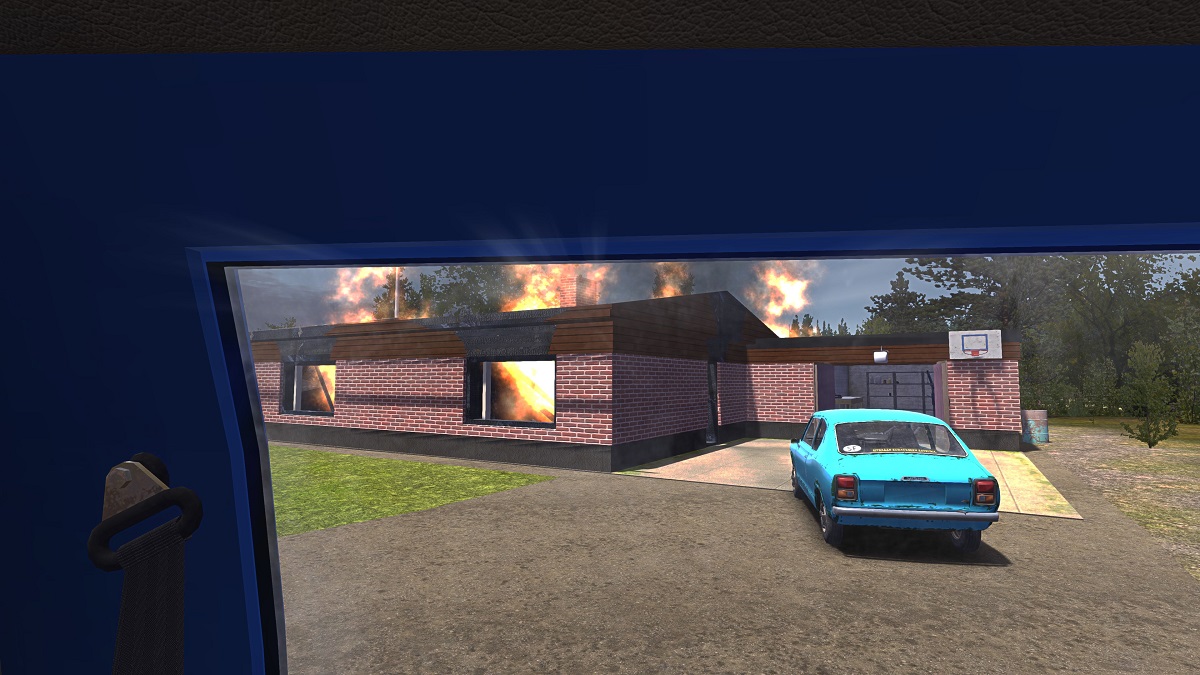Oh, I’ve been waiting for this. My Summer Car has been in Early Access since 2016, and I’ve eagerly awaited the chance to review it for real. It’s finally here, which means there’s no escape. It’s time to pull this bad boy apart.
But I want to be upfront: My Summer Car is wildly unconventional. It has an almost incomparable design philosophy, completely shirking the evolution of games that came before it. As a result, it’s clearly for a specific type of person, but I can’t tell you what that type of person is, nor can I tell with any certainty if you would fit in that category. At best, I hope I can get you curious enough to try it. At worst, you won’t get what I’m talking about.

My Summer Car (PC)
Developer: Amistech
Publisher: Amistech
Released: January 8, 2025
MSRP: $14.99
My Summer Car transports you to rural Finland circa 1995. You’re dropped into the shoes of a young adult left unsupervised for the summer. You’ve got a moped, a front-end loader, and a car that has been busted down to its individual components. The obvious focus is getting that car put together, but the end goal? Ehhh.
There is technically a way to roll the credits without dying, but doing so relies on arcane knowledge. Personally, I’d say the end goal of My Summer Car is whatever you make of it. There are a lot of things that you can do, and some of them result in rewards. There are also a lot of ways you can fuck up, and many of them result in death.
Yeah, death. Rural Finland is a dangerous place and My Summer Car loves to see you suffer. It prominently features a permadeath. This can be turned off, but that comes with its own inconveniences. Alternatively, if you’re savvy, you can create backups of your saves so you can resume later in case of catastrophe.
It’s down to preference as to whether you’ll accept permanent death. I always leave it on because it adds much weight to how you interact with the world. You will buckle your seatbelt and drive more safely if you know that slipping off the narrow roads can undo your progress. However, it’s a cruel game. If any of your mortal stats completely deplete (hunger and thirst, for instance), you can drop dead. There’s a chance you’ll be killed if you pick up the telephone during a thunderstorm (I looked it up, and apparently, that can happen in reality). I once died because I didn’t flip the master breaker before changing a fuse.
Oh, apparently, you can die if you piss on the TV. I don’t know why you’d try that. I guess if you felt the need to just hose down the living room so your parents know you now own the place. I’m not sure why someone would go to the effort of designing and programming that particular way to die, but that demonstrates the developer’s bizarre priorities. One of the new threats is that if you leave the door to your house open, a wasp can get inside. The player character is allergic to wasp stings.
Even if you have death turned off, My Summer Car has many ways to punish you. If you leave the stove on when you leave the house, there is a chance your house will burn down. That’s it. No more house. Technically, you can still survive homeless, but I’m sure you can understand why this would be inconvenient. You can also be thrown in jail if you try to evade police or murder someone (either accidentally or intentionally). Otherwise, there’s always the risk of getting in an accident and totaling your car. The worst part of that scenario is the long, long, very long walk of shame you have to perform back to your home.
Wrecking your car isn’t necessarily the end of your Finland adventure. You can drag it to the local mechanic, Fleetari, to repair. As far as I know, you can’t permanently destroy anything, but it’s hard to tell with this game. Fixes require money, however, and economics are difficult. There are a lot of odd jobs you can do, including chopping and delivering firewood, picking strawberries, sucking septic tanks, and selling homemade alcohol. However, they aren’t always available and some of them have roadblocks of their own, such as having to pay for the septic truck’s gas.
If My Summer Car has anything like what you’d describe as a gameplay loop, it would be work, get money, spend money on car maintenance. But that kind of breaks down when you realize that building the car is mainly for its own sake.

Johannes Rojola has the design sensibilities of a seagull full of cocaine. Efficiency is a foreign concept, and almost nothing added since the start of Early Access has been to the benefit of the player. My Summer Car is a nest of side activities, sub-plots (as if there’s a main plot), and cruelty. He goes into minute detail about some of the strangest things. This might be the most complicated simulation of a sauna that humanity will ever create. I’m not sure who else would think to allow you to piss on the stones.
The whole car construction thing is a real work of effort, though. Each piece is affected by physics, so you’re literally picking things up, moving them to where they need to go, snapping them together, then bolting them on. Like almost everything in this game, it’s temperamental. It’s not the most efficient or intuitive way to do this, either. It works, the depth of it is incredibly satisfying, and you would probably never see this in a big-budget production.
One of the strangest quirks of its design is how much it allows you to clip through objects, and it’s stranger still that you’re practically required to do it to find all the bolts on the car. Many games go to great lengths to keep things corporeal and avoid letting the player phase through the geometry. My Summer Car just says, “fuck it,” and makes it a feature. If something important falls through the floor, you can find it at the landfill.

But, as weird as the design can get, it’s all in the service of some steadfast commitment to realism. While a lot of death in the game can seem unfair, everything fatal is rooted in reality. Yeah, maybe you don’t expect to die just because you’re chopping wood while filled with more alcohol than a brewery, but common sense would tell you it’s a bad idea.
It’s also realistic in the sense that rural life is boring. There’s nowhere to go, there’s nothing on TV, there’s nothing to do. Work is sometimes slow to come in, and much of it requires you to plan your day around it. It isn’t efficient to go and suck out one person’s septic tank; it’s better to wait until all your customers require the service and then do a circuit. You can fill the trailer full of firewood all you want, but the guy who buys it will only request it once a week. The dance pavilion is only active on one day of the week, repairs and orders take time to finish, and the drunk who needs a ride home only calls sporadically.
Also, make sure you pay your phone bill. I was wondering why no one was calling with jobs, then realized that the phone company had cut me off.
If anything, the real challenge of My Summer Car is finding ways to fill your time. Frankly, part of my over 200 hours of playtime was spent idling in the game world while reading something at my desk. If you ask me, it’s boredom by design. It really lets you feel the ennui and makes the simple feeling of getting in the car with somewhere to go feel impactful. Every accomplishment is magnified. Weird, weird stuff.

If there’s one place I’m less enthusiastic about, it’s that absolutely nothing in My Summer Car is explained. In 2016, I figured out how to put a car together by rubbing stuff together and finding out how it fit. But that only gets you so far. It won’t help you tune the engine or tell you what to do when you blow a cylinder. There’s also nothing in the game that tells you that you shouldn’t piss on the TV or that you can cook sausages on the stove by placing them directly on the burner.
This means you must rely on outside information, such as the My Summer Car Wiki. In a way, this makes up for the fact that you can’t just converse with the folks around you to learn things. In reality, you might be able to bring up in conversation that you can only stay awake if you drink a cup of coffee every five minutes and be told that you have caffeine addiction. You might mention to the store clerk that you want to piss on the television, and they’ll say, “I wouldn’t do that, friend. That’s how my uncle died.” That’s kind of outside the boundaries of what’s feasible in game design.
Especially since everyone speaks Finnish in Finland. As you’d expect, a lot of this is subtitled, but not all of it. The stuff that is subtitled might be subtitled poorly. There are talk radio programs, and I can’t help but wish I knew what they were saying. It does lend to feeling like you’re living in a country that doesn’t speak your native language. Although, since your character is canonically Finnish, the exchange student excuse doesn’t make much sense. On the plus side, I now know how to swear in Finnish.

Though, really, if there’s one thing I absolutely hate, it’s the constant degradation of your Satsuma’s individual engine parts. I’m not just talking about the oil and brake fluid, but the alternator and pistons. You can’t just buy new replacement parts, only Fleetari, the mechanic in the area, can fix them. It’s expensive. You have to pull the entire engine out of your car and hand it to the mechanic; he won’t just do it himself at his, y’know, garage. It also takes a little while for him to finish. That would be bad enough, but they degrade so quickly.
It can feel like you’re driving a machine made of gossamer. Even if you don’t bump it around or drive it hard, it’s going to need to see the car doctor way sooner than you’d want. You can drive the van instead, which doesn’t degrade or break down, but it feels weird playing a car-building game and having to take it to a different person to repair behind the scenes every couple of weeks.
There’s a popular supplement for the game, MSCedit, which lets you open your save file and modify it. Cheating, essentially. Well, cheating overtly. However, there’s a point at which the game’s obstacles start to get in the way of your enjoyment, and for me, it’s having to worry about whether or not a piston is on the verge of blowing because I drove Grandma to church one too many times. It’s a step too far and probably should have stopped with replacing fan belts, spark plugs, and gaskets. I get that it’s part of the game’s intentional design – the Satsuma is supposed to be a piece of crap – but I hate it.

As I said, the endpoint of My Summer Car is extremely nebulous. I’m not sure how you’d really reach it without knowing the criteria in advance because it gets pretty specific. Yet, despite this, there are pretty lofty goals to achieve along the way. Getting your Satsuma certified as road-worthy is one. Winning the rally or drag races would be another. Helping the drunk guy move into a new home is a big event. You only get there by simply existing and surviving in the harsh environments of Finland.
There are plenty of lackadaisical simulators out there that revel in their own awkwardness. I’ve stared into the dead eyes of enough Unreal Engine assets to last a lifetime. But My Summer Car is not that. For all its ugliness, its rough edges, and the way it shirks conventional design, it’s a completely earnest product.
Rojola has said that he is “developing dream games for [his] own enjoyment.” Whether or not it’s your dream game is another matter. For me, it very much is. It’s one that I’ve returned to frequently since its Early Access life for another taste of its brutal depiction of Finnish rural life. The friction it creates with its harsh punishment provides meaning to those peaceful moments as you drive along its winding dirt roads. It might strike some as boring, too cryptic, or too unwelcoming, but regardless of whether or not it’s your kind of ride, it’s exactly what it intends to be. There is no experience quite like My Summer Car.
[This review is based on a retail build of the game purchased by the reviewer.]





Published: Jan 10, 2025 01:02 pm